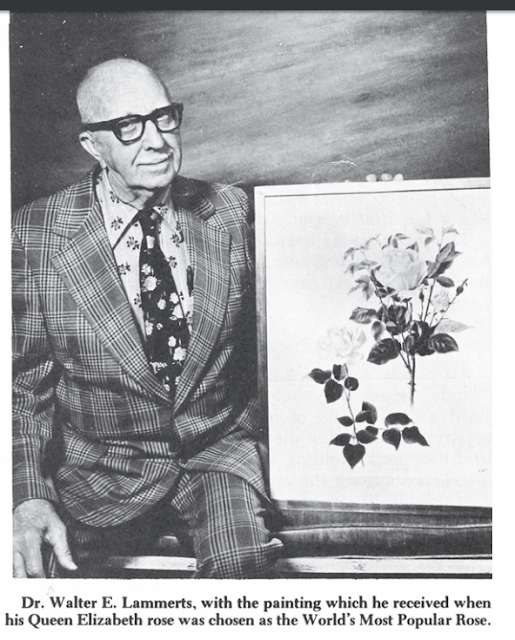 |
| Queen Elizabeth |
A physician knows Dr. Walter Lammerts well - so much in common. We know two doctors with seminary training and the science education to become doctors. Today's MDiv-physician brought up Lammerts, who not only earned a PhD in genetics, but also developed the Queen Elizabeth and Chrysler Imperial roses. Lammerts advocated the Biblical six-day Creation.
We got home and awaited our garden helper. These were jobs I could do on my own. However, they went faster and were more fun with a helper. Before I could look around, he fixed the flat on my wheelbarrow.
Our first job was creating a green fence with Wild Ginger Hidden Lily. As I have written, this bargain rhizome has produced well and prospered with little help from me. The butterfly garden is getting established, so I wanted to move most of the Wild Ginger plantation. One day, some paleontologist may write, "This plant took over a neighborhood and drove everyone away. It was the Tumeric Terror."
 |
| Wild Ginger Hidden Lily loves the sun and spreads from rhizomes. |
We shoveled the plants up out of the soil, lifted the plants with their root balls over the fence, and replanted them along Mrs. Wright's fence. The plants are six feet tall. The soaker hose worked great, with several squirrel holes in it, ideal for watering two plants and nothing else.
When we started six years ago, we had too much shade, too much grass, unkempt trees, and plenty of space. Ranger Bob and a neighbor's cousin trimmed back the trees to give us more sunlight. The shrubs and berries I bought from Almost Eden have all grown well. Now I have fun dividing and moving plants around.
 |
| Bird swing? I thought it was a squirrel seat. |
We also planted more bulbs today, thanks to the recent rain and cold weather. We can open up the soil, drop bulbs in the hole, and expect flowers to come up at the perfect time for their health and growth. Most of them are daffodils, which do well in this climate. I gave away some bulbs and got the same number back - but in hyacinths and aliums (garlic flowers), a good mix.
On damp days, the earthworms wiggle out of the garden onto the driveway. I tell people how fungal connections feed all the plants as I take their autumn leaves away. They have too many leaves - I have too few.
This will be my daisy project next week, weather allowing. We will dig holes around the maple tree, divide one or two daisy clumps, and insert them around the maple. They can be tucked in with peat compost (Stinky Peat), establish root growth in the winter, and spread in the spring.
My gardening plans are similar to the parish. I keep doing those things which are beneficial without assuming any particular results. For instance, we have many ways of spreading God's Word: blogging, Internet services, books, Kindle, and free PDFs. I visit members and they come here. Sassy and I walk around the neighborhood and become part of their lives. And yet it was the broadcast that brought our neighbor to the Christian faith and Holy Baptism before she died. The Bible says nothing about planning, but quite a bit about trusting God's effective Word and broadcasting it (originally an agricultural term) with reckless abandon.
With gardening, we thought roses would be great. I plant them everywhere we live and give the plants away. Jessical Walliser got me involved with beneficial bugs, which paralleled an interest of many - butterflies. Plant it and they will come.
I found a beetle that lives off Butterfly Weed - once I grew it. I planted Joe Pye Weed, and butterflies multiplied. Now we have a wide variety of plants that support the eggs of beneficial bugs or their parents, a family church of sorts.
The analogy should be clear. If I do those things that support a garden and beneficial creatures, the results will be startling over time. There are always disasters, no shows, and garden celebrities. The Hot Cocoa rose I bought as a leftover bargain draws attention all the time.




